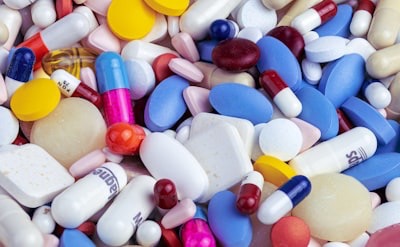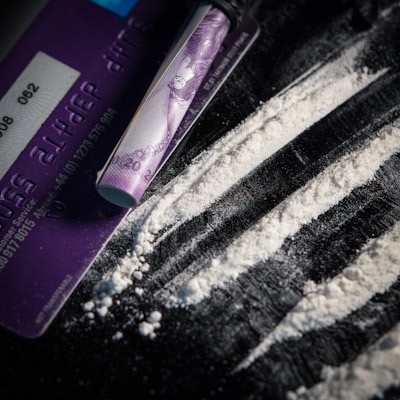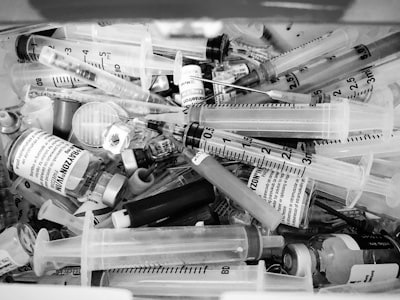The Ultimate List of Most Addictive Drugs

Key Highlights
- There are various addictive drugs that can lead to substance use disorder, including heroin, cocaine, methamphetamine, crack cocaine, nicotine, alcohol, fentanyl, barbiturates, methadone, benzodiazepines, amphetamines, and xylazine.
- These drugs can cause physical and psychological dependence, leading to withdrawal symptoms when individuals try to quit.
- Treatment options for drug addiction include medication-assisted treatment, therapy, support groups, and mental health services.
- It is for individuals struggling with addiction to seek professional help to overcome their substance use disorder.
- Substance abuse can have a significant impact on a person’s mental health, and addressing both issues simultaneously is crucial for successful recovery.
Introduction
Drug addiction is a serious problem that affects millions of individuals worldwide. It is characterized by the compulsive use of drugs despite negative consequences. Substance use disorder, also known as addiction, can have devastating effects on a person’s physical and mental health, relationships, and overall well-being.
There are numerous addictive drugs that can lead to substance use disorder. These drugs vary in their chemical composition, method of use, and potential for addiction. In this blog, we will explore the most addictive drugs worldwide and discuss their effects, risks, and treatment options.
It is important to note that addiction is a complex disease that affects individuals from all walks of life. It does not discriminate based on age, gender, or socioeconomic status. Anyone can become addicted to drugs, and seeking help is the first step towards recovery.
Exploring the Most Addictive Drugs Worldwide

Addiction can occur with a wide range of drugs, but some substances are considered more addictive than others. Here are the top 12 most addictive drugs:
1. Heroin
Heroin is an opiate drug derived from morphine. It is highly addictive and can be injected, snorted, or smoked. Heroin binds to opioid receptors in the brain, leading to a rush of euphoria and a sense of well-being. Continued use of heroin can lead to physical and psychological dependence, causing individuals to experience withdrawal symptoms when they try to quit. The withdrawal symptoms of heroin can be severe and include nausea, vomiting, muscle aches, anxiety, and insomnia. Treatment options for heroin addiction include medication-assisted treatment, therapy, and support groups.
2. Cocaine
Cocaine is a highly addictive stimulant drug derived from the coca plant. It is usually sold as a white powder and can be snorted, smoked, or injected. Cocaine increases dopamine levels in the brain, leading to intense feelings of pleasure and euphoria. However, the effects of cocaine are short-lived, leading individuals to take repeated doses to maintain the high. This increases the risk of addiction and can have severe consequences on a person’s physical and mental health. Treatment for cocaine addiction may involve medication-assisted treatment, therapy, and support groups.
3. Methamphetamine
Methamphetamine, also known as crystal meth, is a highly addictive synthetic stimulant drug. It can be smoked, snorted, or injected. Methamphetamine increases dopamine levels in the brain, leading to increased alertness and a sense of euphoria. The drug has a high potential for addiction and can cause significant physical and psychological harm. Prolonged use of methamphetamine can lead to severe health problems, including cardiovascular damage, tooth decay, and mental health issues. Treatment for methamphetamine addiction may involve medication-assisted treatment, therapy, and support groups.
4. Crack Cocaine
Crack cocaine is a highly addictive form of cocaine that is processed into a rock form. It is usually smoked and provides an intense and immediate high. The high from crack cocaine is short-lived, leading to repeated use to maintain the desired effects. Crack cocaine increases heart rate and blood pressure and can cause severe psychological dependence. Withdrawal from crack cocaine can be challenging, with symptoms such as depression, anxiety, and intense cravings. Treatment for crack cocaine addiction may involve medication-assisted treatment, therapy, and support groups.
5. Nicotine
Nicotine is a highly addictive substance found in tobacco products. It is legal and widely available, making it one of the most commonly abused substances globally. Nicotine addiction is primarily associated with smoking cigarettes, but it can also be found in other forms such as e-cigarettes and vaping devices. Nicotine acts on the brain’s reward system, leading to feelings of pleasure and addiction. Quitting nicotine can be challenging due to the physical and psychological dependence it creates. Withdrawal symptoms of nicotine include irritability, anxiety, depression, and intense cravings. Treatment options for nicotine addiction include medication-assisted treatment, therapy, and support groups.
6. Alcohol
Alcohol is a legal substance that is widely consumed worldwide. While moderate alcohol consumption may not lead to addiction, excessive and prolonged use can lead to alcohol addiction, also known as alcoholism. Alcohol acts on the brain’s reward system, leading to feelings of relaxation and pleasure. Continued use of alcohol can lead to physical and psychological dependence, causing individuals to experience withdrawal symptoms when they try to quit. Alcohol withdrawal can be life-threatening and requires medical supervision. Treatment options for alcohol addiction include medication-assisted treatment, therapy, support groups, and inpatient rehabilitation programs.
7. Fentanyl
Fentanyl is a powerful synthetic opioid painkiller that is used to treat severe pain. It is highly addictive and can cause overdose and death when misused. Fentanyl is often sold illegally and mixed with other drugs, leading to a higher risk of overdose. The withdrawal symptoms of fentanyl can be severe and include muscle and bone pain, insomnia, diarrhea, and intense drug cravings. It is important for individuals addicted to fentanyl to seek immediate medical attention due to the high potential for overdose and the severe nature of withdrawal symptoms. Treatment options for fentanyl addiction may involve medication-assisted treatment, therapy, and support groups.
8. Barbiturates
Barbiturates are a class of prescription drugs that act as central nervous system depressants. They are typically prescribed to treat anxiety, sleep disorders, and seizures. However, they have a high potential for misuse and addiction. Barbiturates can cause feelings of relaxation and sedation, leading to their misuse for recreational purposes. Prolonged use of barbiturates can lead to physical and psychological dependence, causing individuals to experience mood swings, confusion, and memory problems. Treatment for barbiturate addiction may involve medication-assisted treatment, therapy, and support groups.
9. Methadone
Methadone is a medication used in the treatment of opioid addiction. It is a long-acting opioid agonist that helps to reduce withdrawal symptoms and cravings. Methadone is often administered in a controlled medical setting to prevent misuse. While methadone can be effective in treating opioid dependency, it can also be addictive if not used as prescribed. Close monitoring and proper dosing are essential to prevent the development of a secondary addiction to methadone. Treatment options for opioid addiction may involve methadone maintenance programs, therapy, and support groups.
10. Benzodiazepines
Benzodiazepines, such as Xanax and Valium, are a class of prescription drugs commonly used to treat anxiety and insomnia. They act as depressants on the central nervous system, providing a calming effect. However, benzodiazepines have a high potential for psychological dependence and can be addictive when misused. Prolonged use of benzodiazepines can lead to tolerance, meaning higher doses are needed to achieve the desired effects. Withdrawal from benzodiazepines can be challenging and may include symptoms such as anxiety, insomnia, tremors, and seizures. Treatment for benzodiazepine addiction may involve medication-assisted treatment, therapy, and support groups.
11. Amphetamines
Amphetamines are a class of stimulant drugs that increase activity in the central nervous system, resulting in heightened alertness and energy. They are commonly prescribed for attention deficit hyperactivity disorder (ADHD) and narcolepsy. However, amphetamines can be addictive and have a high potential for misuse. Continued use of amphetamines can lead to physical and psychological dependence, causing individuals to experience intense cravings for the drug. Treatment options for amphetamine addiction may involve medication-assisted treatment, therapy, and support groups.
12. Xylazine
Xylazine is an animal tranquilizer that has gained popularity as a recreational drug. It is often mixed with other substances and used illicitly. Xylazine produces sedative effects and can lead to a drop in heart rate and breathing issues in humans. It is commonly referred to as the “Zombie drug” due to its powerful sedative effects. Misuse of xylazine can have severe health consequences, including skin ulcers and infections. The drug is primarily found in South America and poses a significant risk to individuals who use it recreationally. Treatment options for xylazine misuse may involve medical detoxification, therapy, and support groups.
Understanding Addiction and Its Effects

Addiction is a complex disease that affects the brain’s reward system. When a person uses an addictive drug, it triggers the release of dopamine in the brain, creating feelings of pleasure and reinforcing the behavior. Over time, the brain becomes dependent on the drug to produce dopamine, leading to cravings and a compulsive need to use the drug. Substance use disorders can have both short-term and long-term effects on a person’s physical and mental health. It can lead to impaired judgment, decreased cognitive function, and increased risk of mental health disorders.
What Makes a Drug Addictive?
The addictive potential of a drug is determined by several factors. One key factor is the drug’s effect on the brain’s reward system. When a drug is used, it stimulates the release of dopamine, a neurotransmitter associated with pleasure and reward. This creates a pleasurable sensation and reinforces the behavior of using the drug. Over time, the brain becomes dependent on the drug to produce dopamine, leading to cravings and a compulsive need to use the drug.
Other factors that contribute to a drug’s addictive potential include its route of administration, potency, and how quickly it enters the brain. Drugs that are rapidly absorbed and produce intense euphoria are more likely to be addictive. Additionally, drugs that cause physical withdrawal symptoms when use is discontinued can lead to dependence and addiction. It is important to note that not all drugs are equally addictive, and individual susceptibility to addiction can vary.
Short-term and Long-term Effects of Drug Abuse

Drug abuse can have both short-term and long-term effects on a person’s physical and mental health. Short-term effects may include euphoria, increased energy, altered perception, and decreased appetite. However, these effects are often followed by negative consequences such as impaired judgment, reduced coordination, and increased risk-taking behavior. In some cases, drug abuse can lead to overdose and death.
Long-term drug abuse can have serious implications for mental health. It can lead to the development of mental health disorders such as anxiety, depression, and psychosis. Substance use can also exacerbate pre-existing mental health conditions and make them more difficult to treat. In addition, prolonged drug abuse can have detrimental effects on physical health, including liver damage, heart disease, and respiratory problems. It is essential for individuals struggling with drug abuse to seek treatment and support to prevent further harm to their health.
Conclusion
In conclusion, understanding the most addictive drugs and their effects is crucial in addressing the widespread issue of addiction. From heroin to benzodiazepines, each substance poses unique risks and challenges. Recognizing the signs of drug addiction and seeking appropriate help are vital steps towards recovery. Whether legal or illegal, these substances can have devastating short-term and long-term impacts on individuals and communities. If you or someone you know is struggling with addiction, remember that support and resources are available to guide you on the path to healing and recovery.
Frequently Asked Questions
What is the Most Addictive Legal Drug?
Nicotine, found in tobacco products, is considered one of the most addictive legal drugs. It is highly addictive and can lead to physical and psychological dependence. Alcohol abuse is also a common form of addiction, as it is readily available and socially accepted. Prescription drugs, such as opioids and benzodiazepines, can also be highly addictive when misused.
How Does Addiction Start?
Addiction can start in various ways. Peer pressure and social situations can influence a person to experiment with drugs. Continued substance use can lead to physical and psychological dependence, as the brain becomes reliant on the drug to produce feelings of pleasure and reward. Psychological factors, such as stress and trauma, can also contribute to the development of addiction.
Can You Recover From Addiction?
Yes, recovery from addiction is possible with the right support and treatment. Professional help, such as addiction medicine and therapy, can provide individuals with the tools and strategies to overcome addiction. Support groups and a strong support system can also play a crucial role in the recovery process. With a comprehensive approach to treatment and ongoing support, individuals can achieve long-term recovery from addiction.
Where to Find Help for Drug Addiction?
If you or someone you know is struggling with drug addiction, there are various resources available to help. The National Institute on Drug Abuse (NIDA) provides information on treatment options, including medication-assisted treatment and behavioral therapies. Mental health services and substance abuse treatment centers can also offer comprehensive support and treatment for individuals seeking recovery from addiction.
How to Support Someone Struggling With Addiction?
Supporting someone struggling with addiction can be challenging, but there are ways to help. Encouraging them to seek professional help, such as addiction treatment programs, can provide the necessary support and resources for recovery. Family support and involvement in support groups can also make a positive impact. It is important to approach the situation with empathy, understanding, and non-judgment.
Are Prescription Drugs Just As Addictive?
Prescription drugs, when used as prescribed, can be effective and safe. However, when misused or taken without a prescription, they can be highly addictive. The misuse of prescription opioids has contributed to the opioid crisis in the United States. It is important to use prescription drugs only as directed by a healthcare professional to avoid dependency and addiction.
What Are the Signs of Drug Addiction?
Signs of drug addiction may include withdrawal symptoms when the drug is not used, changes in behavior and mood, neglecting responsibilities, and an intense craving for the drug. Other signs may include financial problems, relationship difficulties, and a decline in physical health. It is important to seek help if these signs are present to prevent further harm and support recovery.
hhttps://www.nemours.org/about/kidshealth-medical-editors.html
https://archive.cdc.gov/#/details
https://doi.org/10.1186/s12954-019-0337-z
https://www.cnn.com/2019/01/02/health/most-addictive-substances-partner/index.html
https://www.drugabuse.gov/drugs-abuse/tobacconicotine-vaping